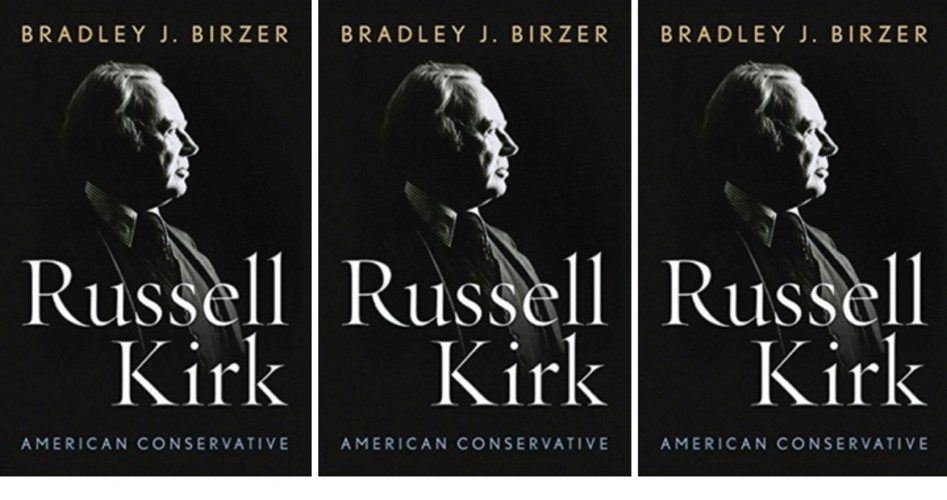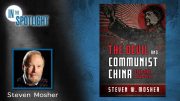
Russell Kirk: American Conservative, by Bradley J. Birzer, Lexington: University Press of Kentucky, 2015, 574 pages, hardcover.
The publication of a new biography of Dr. Russell Kirk should be an event of interest to all traditional conservatives, not least of all because a reflection on the life and work of one of the most significant conservative philosophers of the 20th century provides ample opportunities to reflect on the growing divergence between traditional conservatism and that which is promulgated by neoconservatives and political opportunists.
Kirk is often remembered for advancing a conservative principle that eschews ideology in all forms; in fact, in The Conservative Mind, Kirk quoted John Adams’ definition of “ideology”: “Our English words, Idiocy or Idiotism, express not the meaning or force of it. It is presumed its proper definition is the science of Idiocy.” But part of the plight of the conservatives of our generation is living in the midst of an age dominated by ideologies. The period of the Modern Age extending from roughly the time of the French Revolution to the present may one day be remembered as the Age of Ideology, in which sound political philosophy — established on a foundation built from Hebraic, Greek, and Roman thought — often has been set aside for ephemeral ideological sandcastles that are repeatedly washed away by the realities of human nature and the exigencies that attend wars and rumors of wars. There is, therefore, an inherently conservative character to true political philosophy: Novel notions may rise to prominence for a time, but over the course of generations and centuries, ideologies promulgating doctrines that run counter to the fundamentally unchanging character of Man become stale and are routinely discarded.
Among the political philosophers of the 20th century, there were few Americans who understood the conservative character of political philosophy with the clarity that Dr. Russell Kirk brought to political discourse in American politics. During his lifetime, Russell Amos Kirk (1918-1994) served almost as an embodiment of the conservative philosophy that he propounded: An independent scholar whose integrity required him to remain free of the ideological confines of that which he deemed “Behemoth University,” Kirk also almost entirely eschewed the environs of the “Eastern elite” that view all extension of the Republic outside of the New York-Washington, D.C., corridor as something of a wasteland. When publisher Henry Regnery worried about Kirk’s financial circumstances, Kirk responded: “Poverty has never bothered me; I can live on four hundred dollars cash per annum, if I must; time to think, freedom of action, are much more important to me at present than any possible economic advantage. I have always had to make my own way, opposed rather than aided by the times and the men who run matters for us; and I don’t mind continuing to do so.” A native of Mecosta, Michigan, Dr. Kirk proudly took his stand upon the ground of his ancestral homestead, and, dedicated to a conservative “republic of letters,” spent much of his life fanning the embers of conservative thought so that a new generation of historians, writers, businessmen, philosophers, theologians, et cetera — men and women from a wide variety of vocations — could understand their place as inheritors of the traditions of the West.
Another aspect of the conservative character of political philosophy is that only time will tell whether or not a particular practitioner of such study of “man — the political animal” will be remembered by the generations that follow his own. For the legacy of Russell Kirk, the ongoing interest in his life and study of his writings appears to bode well for his significance among the rising generation of conservatives. With the publication of Bradley Birzer’s Russell Kirk: American Conservative, there is now a definitive biography that places the man within the context of his times with a clarity and scholarship that is not likely to soon be exceeded.
The current Russell Amos Kirk Chair in American Studies and a professor of history at Hillsdale College, Birzer has demonstrated that he is a scholar worthy of his title, producing an in-depth study of the life and thought of the “sage of Mecosta” that surpasses previous endeavors, including McDonald’s Russell Kirk and the Age of Ideology (2004) and Russello’s The Postmodern Imagination of Russell Kirk (2007).
Birzer presents Kirk as one who consciously continued a deeply rooted tradition of Western thought, endeavoring to make that tradition accessible to 20th-century American civilization. In Birzer’s assessment:
Kirk consistently made four points about the principles that should underlie politics in Western civilization, choosing from a number of figures in the Western tradition — not just Plato and Augustine, but also Aristotle, Cicero, Thomas Aquinas, Thomas More, Edmund Burke, John Adams, and Alexis de Tocqueville, to name just a few. First, he believed that every government and society must pursue order, justice, and freedom. Any good society rested on these three principles. Second, he believed whole-heartedly in a Ciceronian natural law as ordering all of creation. Third, he believed that man must live according to a variety of inherited and natural rights, rejecting all forms of egalitarianism except equality before the law. Finally, he thought these three things would thrive best individually and collectively in a republic, the form of government the American Founding Fathers had wisely chosen.
More so than any previous biographer, Birzer traces the development of Kirk’s thought throughout his intellectual career, thus, for example, taking careful note of the shifting influence of various writers in different editions of Kirk’s Conservative Mind, with individuals such as Albert Jay Nock (1870-1945) and Isabel Paterson (1886-1961) disappearing from Kirk’s history of the development of modern conservatism. (In the case of Paterson, Birzer notes, “In essence, Kirk erased her not only from the conservative tradition as he had defined it but in large part from his entire intellectual life. This erasure might be why scholars studying Kirk have either missed or simply ignored this once intense connection to Isabel Paterson.”)
Birzer’s work is not hagiography: He does not hesitate to criticize some of Kirk’s professional decisions, including his willingness to associate with William F. Buckley and National Review. In Birzer’s words, “No matter what distance Kirk attempted to maintain, though, his affiliation with Buckley, conservatism’s enfant terrible, damaged his relationship with others in the literary community.” The result of working with National Review was a significant diversion in the direction of Kirk’s labors:
In this alliance with Buckley, Kirk fundamentally altered the course of his career. During his brief but powerful Christian humanist period, 1953-1956, he produced three of his best books: A Program for Conservatives (1954), Academic Freedom (1955), and Beyond the Dreams of Avarice (1956). He also attempted to dismantle, at least to a considerable extent, any historical or philosophical supports for modern liberalism, progressivism, and nationalism…. Although he never lost his profound love of Christian humanism, that side of him would experience serious competition from the side that he had labeled foolish because it was involved in practical politics for the “quarter-educated” — a conservatism of a different sort.
What does stand out throughout the pages of Birzer’s biography is Kirk’s personal charity and intellectual integrity: He was a man who did not hesitate to provide assistance even to those who might be suspected of taking advantage of him, and he did not allow himself to become embittered by betrayal by former allies (most notably among the ranks of those who would become known as “neoconservatives”).
With at least a half-dozen major studies of his life and work published since his death, Russell Kirk appears likely to endure as one of the defining figures in the development of modern conservatism. Even those who disagree with him on various points cannot deny his influence. In Birzer’s assessment:
In a broad sense, one could compare Kirk and his relationship to many within the broader tent of conservatism and libertarianism with Martin Luther and his relationship to many within larger Protestantism. Just as many Protestants consider Luther a vital part of their history but then dismiss him as not having gone far enough in his reforms, so said many on the right regarding Russell Kirk. All on the right since 1953 have acknowledged their debt to Kirk, but several schools of thought — especially within the more nationalist schools of conservatism, such as the neoconservatives — consider Kirk to have erred significantly in his understanding of the American founding and consequently in his deemphasizing an activist foreign policy and military expansion abroad. Profoundly and deeply influenced by the dropping of the atomic bombs, however, Kirk abhorred the idea of a physically strong and aggressive America. All strength, he argued consistently throughout his life, came from moral, not physical, stature. This was as true for a country as it was for a person.
Russell Kirk: American Conservative provides readers with an opportunity to consider anew one of the most insightful thinkers of the previous century, and to learn both from his scholarship and personal piety something of the essence of what it means to be a traditional conservative.



